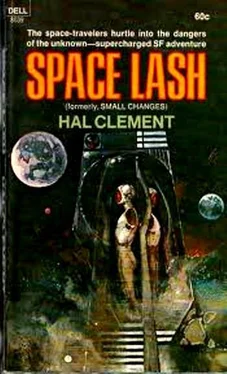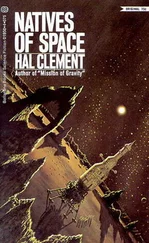Hal Clement - Space Lash
Здесь есть возможность читать онлайн «Hal Clement - Space Lash» весь текст электронной книги совершенно бесплатно (целиком полную версию без сокращений). В некоторых случаях можно слушать аудио, скачать через торрент в формате fb2 и присутствует краткое содержание. Год выпуска: 1969, Жанр: Фантастика и фэнтези, на английском языке. Описание произведения, (предисловие) а так же отзывы посетителей доступны на портале библиотеки ЛибКат.
- Название:Space Lash
- Автор:
- Жанр:
- Год:1969
- ISBN:нет данных
- Рейтинг книги:3 / 5. Голосов: 1
-
Избранное:Добавить в избранное
- Отзывы:
-
Ваша оценка:
- 60
- 1
- 2
- 3
- 4
- 5
Space Lash: краткое содержание, описание и аннотация
Предлагаем к чтению аннотацию, описание, краткое содержание или предисловие (зависит от того, что написал сам автор книги «Space Lash»). Если вы не нашли необходимую информацию о книге — напишите в комментариях, мы постараемся отыскать её.
Space Lash — читать онлайн бесплатно полную книгу (весь текст) целиком
Ниже представлен текст книги, разбитый по страницам. Система сохранения места последней прочитанной страницы, позволяет с удобством читать онлайн бесплатно книгу «Space Lash», без необходимости каждый раз заново искать на чём Вы остановились. Поставьте закладку, и сможете в любой момент перейти на страницу, на которой закончили чтение.
Интервал:
Закладка:
“It doesn't show for Teneriffe, either.”
“That's true, but there isn't much choice there, and we know that there's at least one high peak in a fairly small area. Plato is well over three hundred kilometers around.”
“It's still a closer walk, and I don't see why, if there are high peaks at any part of the rim, they shouldn't be fairly common all around the circumference.”
“I don't see why either,” retorted Ridging, “but I've seen several craters for which that wasn't true. So have you.” Shandara had no immediate answer to this, but he had no intention of exposing himself to an unnecessarily long walk if he could help it. The instruments to be carried were admittedly light, at least on the Moon; but there would be no chance of opening spacesuits until the men got back to the tractor, and spacesuits got quite uncomfortable after a while.
It was the magnetometer that won Shandara's point for him. This pleased him greatly at the time, though he was heard to express a different opinion later. The meter itself did not attract attention until the men were about ready to start, and he had resigned himself to the long walk after a good deal more argument; but a final check of the recorders already operating made Ridging stop and think.
“Say, Shan, have you noticed any sunspots lately?”
“Haven't looked at the sun, and don't plan to.”
“I know. I mean, have any of the astronomers mentioned anything of the sort?”
“I didn't hear them, and we'll never be able to ask until we get back. Why?”
“I'd say there was a magnetic storm of some sort going on. The intensity, dip, and azimuth readings have all changed quite a bit in the last hour.”
“I thought dip was near vertical anyway.”
“It is, but that doesn't keep it from changing. You know, Shan, maybe it would be better if we went to Plato, instead.”
“That's what I've been saying all along. What's changed your mind?”
“This magnetic business. On Earth, such storms are caused by charged particles from the sun, deflected by the planet's magnetic field and forming what amounts to tremendous electric currents which naturally produce fields of their own. If that's what is happening here, it would be nice to get even closer to the local magnetic vertical, if we can; and that seems to be in, or at least near, Plato.”
“That suits me. I've been arguing that way all along. I'm with you.”
“There's one other thing…"
“What?”
“This magnetometer ought to go along with us, as well as the stuff we were taking anyway. Do you mind helping with the extra weight?” Shandara had not considered this aspect of the matter, but since his arguments had been founded on the question of time rather than effort he agreed readily to the additional labor.
“All right. Just a few minutes while I dismount and repack this gadget, and we'll be on our way.” Ridging set to work, and was ready in the specified time, since the apparatus had been designed to be handled by space-suited men. The carrying racks that took the place of regular packs made the travelers look top-heavy, but they had long since learned to keep their balance under such loads. They turned until the nearly motionless sun was behind them and to their right, and set out for the hills ahead.
These elevations were not the peaks they expected to use; the Moon's near horizon made those still invisible. They did, however, represent the outer reaches of the area which had been disturbed by whatever monstrous explosion had blown the ring of Plato in the Moon's crust. As far as the men were concerned, these hills simply meant that very little of their journey would be across level ground, which pleased them just as well. Level ground was sometimes an inch or two deep in dust; and while dust could not hide deep cracks it could and sometimes did fill broader hollows and cover irregularities where one could trip. For a top-heavy man, this could be a serious nuisance. Relatively little dust had been encountered by any of the expedition up to this point, since most of their work had involved slopes or peaks; but a few annoying lessons had been learned.
Shandara and Ridging stuck to the relatively dust-free slopes, therefore. The going was easy enough for experienced men, and they traveled at pretty fair speed — some ten or twelve miles an hour, they judged. The tractor soon disappeared, and compasses were useless, but both men had a good eye for country, and were used enough to the Lunar landscape to have no particular difficulty in finding distinctive features. They said little, except to call each other's attention to particularly good landmarks.
The general ground level was going up after the first hour and a half, though there was still plenty of downhill travel. A relatively near line of peaks ahead was presumably the crater rim; there was little difficulty in deciding on the most suitable one and heading for it. Naturally the footing became worse and the slopes steeper as they approached, but nothing was dangerous even yet. Such crevasses as existed were easy both to see and to jump, and there are few loose rocks on the Moon.
It was only about three and a half hours after leaving the tractor, therefore, that the two men reached the peak they had selected, and looked out over the great walled plain of Plato. They couldn't see all of it, of course; Plato is a hundred kilometers across, and even from a height of two thousand meters the farther side of the floor lies below the horizon. The opposite rim could be seen, of course, but there was no easy way to tell whether any of the peaks visible there were as high as the one from which the men saw them. It didn't really matter; this one was high enough for their purposes.
The instruments were unloaded and set up in half an hour. Ridging did most of the work, with a professional single-mindedness which Shandara made no attempt to emulate. The geophysicist scarcely glanced at the crater floor after his first look around upon their arrival, while Shandara did little else. Ridging was not surprised; he had been reasonably sure that his friend had had ulterior reasons for wanting to come this way.
“All right,” he said, as he straightened up after closing the last switch, “when do we go down, and how long do we take?”
“Go down where?” asked Shandara innocently.
“Down to the crater floor, I suppose. I'm sure you don't see enough to satisfy you from here. It's just an ordinary crater, of course, but it's three times the diameter of Harpalus even if the walls are less than half as high, and you'll surely want to see every square meter of the floor.”
“I'll want to see some of the floor, anyway.” Shandara's tone carried feeling even through the suit radios. It's nice of you to realize that we have to go down. I wish you realized why.”
“You mean. . you mean you really expect to climb down there?” Ridging, in spite of his knowledge of the other's interests, was startled. “I didn't really mean…"
“I didn't think you did. You haven't looked over the edge once.”
Ridging repaired the omission, letting his gaze sweep carefully over the grayish plain at the foot of the slope. He knew that the floor of Plato was one of the darker areas on the Moon, but had never supposed that this fact constituted a major problem.
“I don't get it,” he said at last. “I don't see anything. The floor is smoother than that of Harpalus, I'd say, but I'm not really sure even of that, from this distance. It's a couple of kilos down and I don't know how far over.”
“You brought the map.” It was not a question.
“Of course.”
“Look at it. It's a good one.” Ridging obeyed, bewildered. The map was good, as Shandara had said; its scale was sufficient to show Plato some fifteen centimeters across, with plenty of detail. It was basically an enlargement of a map published on Earth, from telescopic observations; but a good deal of detail had been added from photographs taken during the approach and landing of the expedition. Shandara knew that; it was largely his own work.
Читать дальшеИнтервал:
Закладка:
Похожие книги на «Space Lash»
Представляем Вашему вниманию похожие книги на «Space Lash» списком для выбора. Мы отобрали схожую по названию и смыслу литературу в надежде предоставить читателям больше вариантов отыскать новые, интересные, ещё непрочитанные произведения.
Обсуждение, отзывы о книге «Space Lash» и просто собственные мнения читателей. Оставьте ваши комментарии, напишите, что Вы думаете о произведении, его смысле или главных героях. Укажите что конкретно понравилось, а что нет, и почему Вы так считаете.












